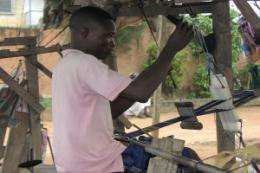Mobile phone 'Have-nots' sidelined

(PhysOrg.com) -- The explosive growth of mobile phones in the developing world has sidelined tens of millions of people, according to new research.
The study by experts from The Universities of Manchester and Strathclyde found that despite the obvious benefits of mobile phones, the "haves" in Africa's informal sector are getting richer, while the "have-nots" are losing income.
"For sure, the benefits of mobile phones to the developing world are huge as they are used as a primary form of communication: landlines are much less common," said Professor Heeks, who is Director of The University of Manchester's Centre for Development Informatics.
"But that growth does not reach everyone and without a mobile, you are cut off socially and economically.
"We talked a few years back about the "digital divide"; now we are recognising the "mobile divide."
Part of the research examined the experience of a group of workers in Nigeria's informal cloth-weaving sector.
The sector employs tens of thousands and centres on the weaving of ceremonial dress for occasions like birth celebrations and marriages.
"The mobile divide was starkly brought out in our interviews with the weavers."
"There is no reason to doubt that inequalities in Nigeria will be consistent across the developing world," said Professor Heeks.
Latest International Telecommunication Union figures reveal stark differences in mobile ownership: in Europe there are 111 mobiles per 100 people but in Africa, the figure is 28 per 100.
And around 350 million Africans live in areas not yet reached by a mobile signal according to the GSM Association.
Where they can get a mobile phone, the poor, says Professor Heeks, spend up to 20 per cent of their disposable income on it - more than they spend on education.
"More than 300 million Africans have access to a mobile phone, though some are shared for example within families.
"But that still leaves hundreds of millions of people on the wrong side of the mobile divide."
The study found that the weavers who owned a mobile were able to dramatically cut the number of journeys to meet thread suppliers, traders, and customers.
Dr Abi Jagun from the University of Strathclyde said: "The weavers value this as much for the risks avoided as for the money and time saved: travel in Nigeria is associated with both robbery and accidents.
"They are also able to stay in constant touch with their business contacts".
However, weavers without a phone are forced to go on costly and dangerous journeys making it increasingly hard to obtain orders.
She added : "The poorer weavers told of travelling many hours after hearing rumours of a potential order, only to find when they arrived that it had already been assigned by phone to someone else. They were therefore losing business and losing income.
"Customers and traders, all of whom have phones, prefer to do business with phone-owning weavers."
More information: A Nigerian Case Study was published in Information Technologies and International Development in February 2009. It is available at itidjournal.org/itid/article/view/310/142
Provided by University of Manchester
















